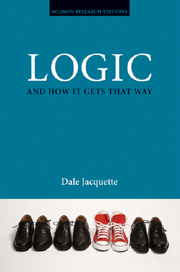Book contents
- Frontmatter
- Contents
- Preface
- Introduction: Logic, philosophy, analysis
- 1 Logical form
- 2 Monkey raisins
- 3 The secret life of truth-functions
- 4 Reference and identity
- 5 Intensional versus extensional logic and semantics
- 6 Truth
- 7 Logical and semantic paradoxes
- Conclusion: Moral lessons of logic
- Notes
- References
- Index
Conclusion: Moral lessons of logic
- Frontmatter
- Contents
- Preface
- Introduction: Logic, philosophy, analysis
- 1 Logical form
- 2 Monkey raisins
- 3 The secret life of truth-functions
- 4 Reference and identity
- 5 Intensional versus extensional logic and semantics
- 6 Truth
- 7 Logical and semantic paradoxes
- Conclusion: Moral lessons of logic
- Notes
- References
- Index
Summary
In these chapters, I have tried not only to portray the technical progress of logic as a formal discipline in response to a variety of conceptual problems, but to introduce, albeit implicitly, from a somewhat unorthodox but rigorously argued philosophical perspective, what I consider to be some of the moral lessons that the development of logic and metalogic might be thought to teach.
The moral dimension of modern symbolic logic, as I understand it, recognizes logic as a product of human culture that stands alongside history, science, religion and art. As such, logic is a microcosm and allegory of many aspects of the human condition. When we try to have everything we want in logic or in life, we usually pay an unexpected price for it somewhere later down the line. This seems to have been the fate of the most ambitious formal symbolic logics, of Frege's and Whitehead and Russell's logicism, and of such projects as Hilbert's formalist programme in metamathematics. All of these efforts, despite their first bright promise and intuitive sense of rightness, have turned out to be limited in their pretensions by logic's own symbolic devices as revealed especially in the great variety of paradoxes, involving syntactical logical, semantic and set-theoretical diagonalizations, and formal metatheoretical limitations.
Logic as such offers a moral parable for life. It is not until the full consequences of what we have set in motion by undertaking an action or adopting an axiom in a formal system become clear that the world or logic itself can come crashing down on our most naively cherished aspirations.
- Type
- Chapter
- Information
- Logic and How it Gets That Way , pp. 265 - 268Publisher: Acumen PublishingPrint publication year: 2010

